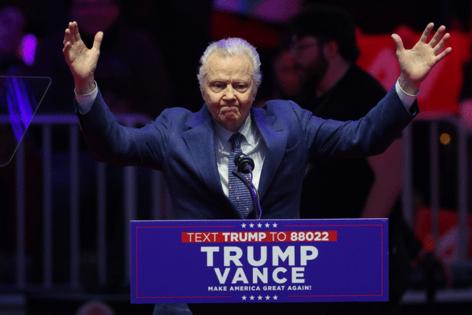Hollywood's chaotic week of Trump, tariffs and tax break talk ends with no clear direction
Published in Political News
It's been a chaotic week in Hollywood.
Less than a week ago, President Trump called for 100% tariffs on movies made outside the U.S., a move meant to bring productions home that most people in the industry believe would have devastating consequences for the entertainment business.
Then industry trade publication Deadline published the "Make Hollywood Great" proposal from actor Jon Voight, one of Trump's so-called Hollywood ambassadors, that he recently presented to the president.
It has all led to confusion and disagreement from those in the industry about how to make the most of the current spotlight on a crucial issue — maintaining production and jobs in the U.S. — but in a way that will actually benefit the entertainment business.
"Any financial help we can give to filmmakers is going to keep filmmakers at home," said George Huang, professor of screenwriting at the UCLA School of Theater, Film and Television. "Ideally, legislators will try to be creative and try to support what I think is one of our most highly sought-after industries here in the United States."
On Friday, the Motion Picture Association trade group convened a meeting with movie studio chiefs to discuss how to respond to the Trump administration's plan and how to advocate for measures they think would actually help boost domestic filming.
As other Hollywood unions and organization put out statements about the federal issues, the MPA was conspicuously silent publicly.
Representatives from the MPA and the studios declined to comment Friday.
The MPA — the Washington, D.C.-based lobbying organization for the major studios — has historically faced a difficult task getting its members to agree to anything, and that has only increased since the group expanded to include streaming services Netflix and Amazon, according to people familiar with the organization. The companies all have different priorities and, in some cases, completely different business models.
Some studio executives are hoping Voight's list of ideas to rebuild Hollywood becomes a rough blueprint for a more realistic alternative to tariffs.
Studio chiefs say it's often too expensive to make movies and TV shows in the U.S., even with the generous incentives offered by various states. Movies are a low-margin business, and shooting abroad can offset production costs by as much as 30%.
On Wednesday, studio executives from Sony, HBO and Amazon discussed the issue at the Milken Institute Global Conference in Beverly Hills. They highlighted the limits of incentives — even if the U.S. offered tax credits, sometimes projects have to be shot overseas because of the story.
"We're going overseas because we have a show set in London," said "The Diplomat" creator Debora Cahn. "We want castles and palaces, and we don't have enough of them here."
What's clear is that most of Hollywood — as well as current and former civic leaders — do not favor the use of tariffs to bring production back to the U.S.
"It's going to kill us," former Los Angeles Mayor Antonio Villaraigosa told The Times. "That's not going to help us. It's going to hurt us."
Rep. Sydney Kamlager-Dove, a Democrat who represents Los Angeles, too, was skeptical of Trump's tariff announcement.
"This is the absolute worst way to go about supporting an industry so critical to not just L.A. and the state but the country," she said. "Filmed entertainment is one of the best products we are able to produce."
It's why Voight's plan is being looked at with interest.
The centerpiece is a "new federal American Production incentive," which would allow a 20% tax credit — or an added 10% on top of a state's film incentive.
Projects that qualify would have to meet a minimum threshold American "cultural test," similar to what Britain requires for film incentives. The incentive would apply to traditional broadcasters and streaming services, including Netflix, Disney+, Hulu and digital platforms, including YouTube and Facebook.
The plan also calls for Section 181 of the federal tax code to be renewed for another five years. It recommends raising the caps on film production to $20 million (or $40 million if the project was shot in a rural area). The proposal recognizes film budgets have increased since 2004.
The group also suggested extending Section 181 to cover movie theater owners for facility improvements and equipment updates to their movie houses.
"Families going to the movies is one of the great American past times that must be preserved," the draft plan noted.
The plan did raise the specter of tariffs, saying that if a U.S.-based production "could have been produced in the U.S." but moved to a foreign country to take advantage of a tax incentive, then "a tariff will be placed on that production equal to 120% of the value of the foreign incentive received."
"This is not meant as a penalty, but a necessary step to 'level the playing field,' while not creating a never-ending cycle of chasing the highest incentive," according to the draft.
After publication, Voight's manager, Steven Paul, one of the authors, said the document was "crafted solely for the purpose of discussion."
(Los Angeles Times staff writers Wendy Lee, Meg James, Ryan Faughnder and Seema Mehta contributed to this report.)
©2025 Los Angeles Times. Visit at latimes.com. Distributed by Tribune Content Agency, LLC.




























































Comments